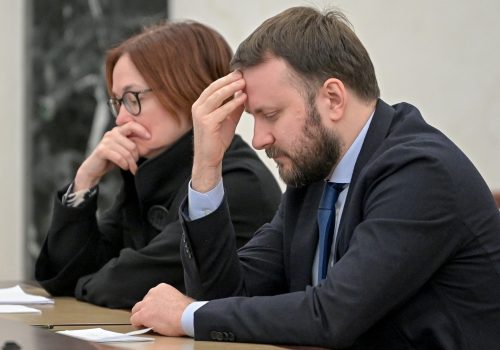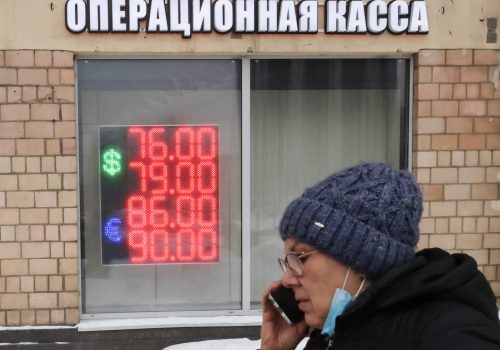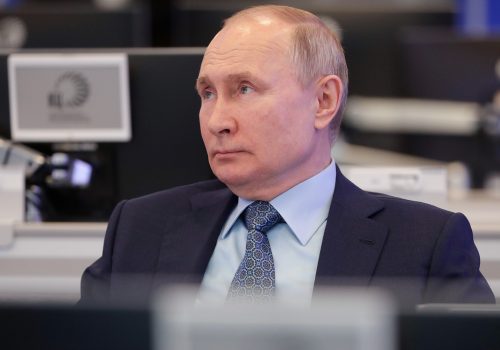The US and European sanctions imposed against the Kremlin so far have exceeded many expectations—including probably those of Russian President Vladimir Putin. Their impact has been to flatten the Russian financial system, crash the ruble, spur a likely sovereign default, and probably move the Russian economy into a depression. “Fortress Russia” is no more.
The impact on industrial production and critical imports, due to restrictions on semiconductor exports, may be profound. The Kremlin reaction has exacerbated Russia’s long-term isolation (and thus stagnation) by imposing capital controls on corporations and individuals, demanding that Russian companies turn over much of their foreign exchange to central authorities, and paying creditors in rubles (likely leading to default).
Most recently, the United States and United Kingdom announced that they would ban imports of Russian oil—the first major move against the Kremlin’s lifeblood—while the European Union is considering restricting its purchases of Russian natural gas. In less than two weeks, Putin’s war has vaulted Russia back to Soviet levels of economic isolation in a profoundly more integrated world. This will spell disaster for the Russian people.
While the Biden administration had prepared its sanctions well, it had run through its initial set of options by February 25—and a day later, escalated quicker than anyone had anticipated by locking down close to two thirds of Russia’s pre-war foreign-exchange reserves (about $630 billion). The remaining reserves (cash, gold, Chinese-held bonds) are insufficient to fill the massive holes already dug by Western sanctions.
Still, Putin’s forces are continuing their attack, including by targeting civilians and non-military infrastructure, while outrage is intensifying in the United States, Europe, and beyond. This is why the West needs to keep developing escalatory options for sanctions to keep pace with Putin’s increasing violence. There is still room for more targeting before these sanctions reach a level comparable to those against Iran or North Korea.
So what’s left on the menu of escalatory options? We offer several in a roughly ascending order of magnitude (although apart from potential European restrictions on Russian energy, their impact will unlikely be as dramatic as those steps already taken). The administration may choose a higher-impact option more quickly in response to a particularly egregious Russian attack on civilians, such as Wednesday’s reported bombing of a maternity hospital in Mariupol:
- Target oligarchs, cronies, wallets, and Putin’s assets. The West has tentatively stepped into crony/oligarch sanctions so far by only targeting a few tycoons, perhaps out of some hope of finally splitting off the billionaires from Putin’s orbit. The idea that the oligarch class in Russia will step up and on its own force better behavior out of the Kremlin, never likely, is increasingly doubtful. Nevertheless, these billionaires, especially those closest to Putin and the Kremlin, present attractive targets for sanctions due to their involvement in the Russian economy and in Putin’s peculiar kleptocracy. It may be somewhat symbolic—when stacked against the devastation in Ukraine—to see a six-hundred-million-dollar yacht seized by customs agents, but symbols can help sow uncertainty and panic in Russian markets and further diminish confidence in the Russian economy. These sanctions will show Putin’s cronies and subordinates that Putin is damaging their interests and those of their families.
- Extend sanctions on companies. Despite hitting the Russian financial and defense sectors hard since 2014, the West can still target many other entities that are either close to the Kremlin or otherwise vulnerable without carrying unmanageable spillover risk. The state-owned Gazprombank and Russian Agricultural Bank, as well as the private AlfaBank, are already subject to financing restrictions but could be next for full blocking sanctions, which would effectively lock them out of the international financial system. The same holds true for transportation companies Sovcomflot and Russian Railways, and diamond company Alrosa. Meanwhile, major Russian insurer Sogaz has been sanctioned by the European Union but not the United States. Carveouts might be needed to manage spillover effects, but there is a wide swath of the Russian private and state-controlled economy that remains an attractive target.
- Sanction Russian stock markets. If the West is seeking to further undermine domestic capital markets—having already largely severed Russia’s access to external markets—sanctions targeting the major markets, such as the Moscow Exchange, may provide a path to additional market turmoil. This would also address the possibility that some Western or Chinese firms could buy Russian assets at rock-bottom prices and hold onto them for years. While such purchases may not actually provide much capital to Russian companies (or otherwise dramatically shift the landscape), they would send an unseemly signal of corporate profiteering at the same time that many western enterprises are pulling out of Russia.
- Block the Russian government. This would amount to sanctioning all of Russia’s state-owned companies. While many are already sanctioned, a full blocking would further isolate Putin and his sources of power from the global economy and effectively place Russia’s government on par with those of Cuba, Iran, North Korea, and Syria. This action would likely require wind-downs or other carve-outs to not roil energy markets—since oil and gas giants Rosneft and Gazprom, respectively, are both state-owned—but it could still be effective even with such accommodations.
- Ban new investment in Russia. While the White House banned new investment in Russian energy projects on Tuesday, the logical escalatory option could be to extend that ban to the entire Russian economy. The economy is relatively concentrated in a smaller number of key companies in the major revenue sectors, and if those targets are exhausted, a new investment ban may provide the middle ground for Western policymakers seeking a broad impact from the cooling effect a ban would have on any US businesses operating in Russia while stopping short of a full financial embargo. With the West’s tapering of energy purchases and a ban on exports of Russian commodities already affecting the key areas of Western trade with Russia, there may not be much spillover to the West from new investment restrictions.
- Enact a full financial embargo. This rests at the far end of the sanctions spectrum and would ban all transactions, exports, and imports with Russia. This would be the final significant step for the West to remove Russia from the global economy and would place the country under what is commonly known as “Iran-style sanctions,” which would impede just about all business. A few weeks ago, this would have been nearly unthinkable—but given the almost frantic escalation in sanctions it seems that the West may be approaching this faster than anyone could anticipate if Putin continues his ultraviolent extraterritorial ambitions.
- Hit sanctions evaders. Enforcing all these measures is critical to maintaining a sanctions regime. The United States, United Kingdom, and European Union must assume that Russians will attempt to evade punishment, including by creating shell companies to disguise sanctioned ownership. This will be an ongoing challenge, even with secondary sanctions in place for all sanctioned Russians courtesy of the 2017 Countering America’s Adversaries Through Sanctions Act, and the Biden administration will need to maintain intensive and real-time consultations with allies and others about compliance and common approaches—possibly by establishing a standing sanctions consultations group. The US Senate also needs to confirm the administration’s nominee for State Department sanctions coordinator, James O’Brien, who is inexplicably still in the confirmation process despite the urgency of the issue. O’Brien is a veteran policy operator, the sort of skilled and respected Washington figure who knows how to make things happen in the foreign-policy world while being unknown to the general public.
If Putin decides to seriously consider a diplomatic way out of his war, which he has not yet done, sanctions relief should be the carrot. Undersecretary of State Victoria Nuland recently outlined conditions for removing sanctions: a Russian withdrawal from Ukraine and assistance in the rebuilding effort. The issue of removal or suspension of sanctions would be complex—especially since Putin’s promises to adhere to any agreement with Ukraine simply cannot be trusted.
Putin has expressed regret over the collapse of the Soviet Union. But he may find that Russians—long used to the fruits of globalization—will not like having it back.
Brian O’Toole is a nonresident senior fellow with the Atlantic Council’s GeoEconomics Center. He is a former senior adviser to the director of the Office of Foreign Assets Control (OFAC) at the US Department of the Treasury. Follow him on Twitter @brianoftoole.
Daniel Fried is the Weiser Family distinguished fellow at the Atlantic Council. He was the coordinator for sanctions policy during the Obama administration, assistant secretary of state for Europe and Eurasia during the Bush administration, and senior director at the National Security Council for the Clinton and Bush administrations. He also served as ambassador to Poland during the Clinton administration. Follow him on Twitter @AmbDanFried.
Further reading
Fri, Mar 4, 2022
The Russian Central Bank is running out of options
New Atlanticist By Charles Lichfield
The now-embattled institution didn't expect to be sanctioned so quickly—and was forced to prepare its response in a hurry.
Tue, Feb 8, 2022
For Biden, wreaking havoc on Russia’s economy is the least bad option
New Atlanticist By Brian O’Toole, Daniel Fried, Edward Fishman
Putin is testing the West’s resolve for tough measures—which is why maximalist banking sanctions are the linchpin of an effective deterrent.
Fri, Jan 21, 2022
What if Russia invades Ukraine (again)? Consider these options for sanctions escalation.
New Atlanticist By Brian O’Toole, Daniel Fried
Whatever Putin’s intentions, the Kremlin’s anti-Ukrainian propaganda has not been so loud since 2014. The United States and its allies need to respond in order to prevent a major military escalation at worst and at least blunt Putin’s effort to gain political advantage through intimidation.
Image: Rosneft boss Igor Setchine's yacht Amore Vero—meaning "true love"—has been seized by the French authorities and is at La Ciotat harbour in south of France, on March 4, 2022. France has proceeded, under the implementation of European sanctions against Russia, to the seizure of a yacht linked to the Russian oligarch Igor Sechin, boss of the oil giant Rosneft. Photo by Florian Escoffier/ABACAPRESS.COM via Reuters.



